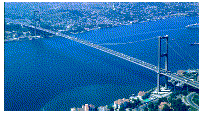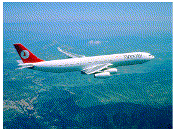 Turkey,
standing at the crossroads of major trade routes between Europe and
Asia and being the cradle of a succession of major world
civilizations dating back 8000 years, has many transit roads between
West and East passing through the country. Turkey,
standing at the crossroads of major trade routes between Europe and
Asia and being the cradle of a succession of major world
civilizations dating back 8000 years, has many transit roads between
West and East passing through the country.
Turkey has the most sophisticated
infrastructure level in the region. One of the prerequisites of
economic development is efficient transportation services and Turkey
has attached importance to this factor for many years. During the
last decade significant efforts were spent to renew and develop the
transportation and communication systems and as a result,
significant improvements were achieved. While the fixed capital
investment in these sectors constituted 14.8% of total investments
in 1980, this rate gradually increased to 23.9% in 1985. However in
1990 the investment rate diminished slightly to 20%. This rate was
17.4% in 1994.
Investments to improve the highway
system resulted in highways dominating cargo and passenger
transportation. As a result of developments and improvements in the
highway network, the relative importance of highways has certainly
increased. The highway length has reached 61,245 km of which 1246 km
are motorway and 50,684 km are asphalt roads. The number of mobile
transportation vehicles reached 4,905,872 as of the end of October
1995. 61% of this total consisted of automobiles, 5.3% public
transportation vehicles, 14.4% cargo transportation vehicles and
finally 19.3% special purpose vehicles, road construction and works
machinery.
The railways are state-owned and
operated. Investment in this sector has been aimed at improving
standards so that rail transport can become a competitive
alternative to road and air transport. With the projects that are
underway at present and with those to be pursued in the coming
years, the length of electrified lines will increase from 1093 km to
2,938 km. As a rolling stock fleet, Turkish State Railways (TCDD)
has 545 diesel mainline, 59 electric locomotives, 99 multiple units,
18,532 freight cars and 1,100 passenger coaches.
The length of railways is 10,386 km
of which 1093 km are electrified. The total number of passengers in
this sector reached 104.9 million in 1995 (provisional). 15.5
million tons of cargo was transported in 1995.
Turkey, a country surrounded by seas
on three sides, places great emphasis on port development and sea
transport. Turkey with its 8430 km of coastline, has 15 principal
state-owned ports, around 30 municipal wharfs, about 35 special
purpose wharfs belonging to industrial complexes, and a number of
private wharfs and quays. The state-owned ports of Samsun,
Haydarpasa (Istanbul), Derince, Bandirma, Izmir, Mersin and
Iskenderun are operated by the Turkish State Railways (TCDD) and
29.2 million tons cargo was transported in 1995. A high proportion
of the country's overall transport traffic is handled by these
harbours.
Shipping activity grew rapidly in the
late 1970s and early 1980s. Although the capacity of the Turkish
maritime fleet which was 2 million DWT in 1980 and reached 6 million
DWT in the first four years of the 1980s as a result of the measures
undertaken, the capacity of the total maritime fleet was 5.6 million
DWT in 1991. Two million gross tons of cargo were transported in
1981 and that amount reached 40 million tons in 1990's. The Turkish
Cargo Lines (Maritime Fleet) tonnage increased to 7.8 million DWT in
1993 and approximately 8.6 million DWT at the end of 1994. The share
of vessels in overseas transportation flying the Turkish flag
increased to 40 percent in 1993. The main ports are Istanbul, Izmir,
Izmit, Samsun, Trabzon, Mersin and Iskenderun which provide modern
facilities under a well advanced infrastructure.
 Turkey
has airports handling international and domestic flights, the major
international terminals being Istanbul (Ataturk), Ankara (Esenboga),
Izmir (Adnan Menderes) Adana, Trabzon, Erzurum, Kars, Gaziantep,
Sinop, Bursa, Samsun, Dalaman and Antalya are major charter flight
points. International airlines operate in Turkey in increasing
numbers each year. Turkish Airlines flies to 55 points abroad and 22
cities within Turkey. At present, the Turkish Airlines fleet is
composed of a total of 53 passenger airplanes with a seating
capacity of 8835. With regard to airline transportation, private
companies were also authorized to establish and operate their own
fleets. While 13.7 million passengers were transported in 1990, the
figure reached 22.3 million passengers in 1994. Airway
transportation was 77 public and private companies, 441 planes with
19,528 seating capacity in 1994. All international regulations
regarding scheduled airline operations are fully applicable, but
there are few restrictions for charter airline services. The latest
restriction for charters is the requirement of ownership of the
aircraft. Turkey
has airports handling international and domestic flights, the major
international terminals being Istanbul (Ataturk), Ankara (Esenboga),
Izmir (Adnan Menderes) Adana, Trabzon, Erzurum, Kars, Gaziantep,
Sinop, Bursa, Samsun, Dalaman and Antalya are major charter flight
points. International airlines operate in Turkey in increasing
numbers each year. Turkish Airlines flies to 55 points abroad and 22
cities within Turkey. At present, the Turkish Airlines fleet is
composed of a total of 53 passenger airplanes with a seating
capacity of 8835. With regard to airline transportation, private
companies were also authorized to establish and operate their own
fleets. While 13.7 million passengers were transported in 1990, the
figure reached 22.3 million passengers in 1994. Airway
transportation was 77 public and private companies, 441 planes with
19,528 seating capacity in 1994. All international regulations
regarding scheduled airline operations are fully applicable, but
there are few restrictions for charter airline services. The latest
restriction for charters is the requirement of ownership of the
aircraft.
|

